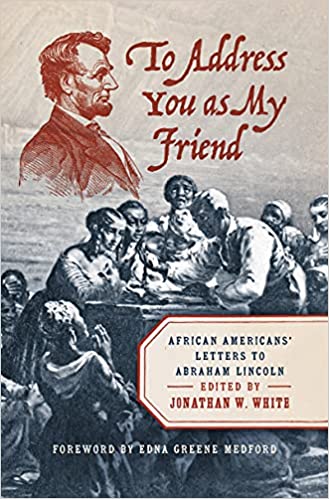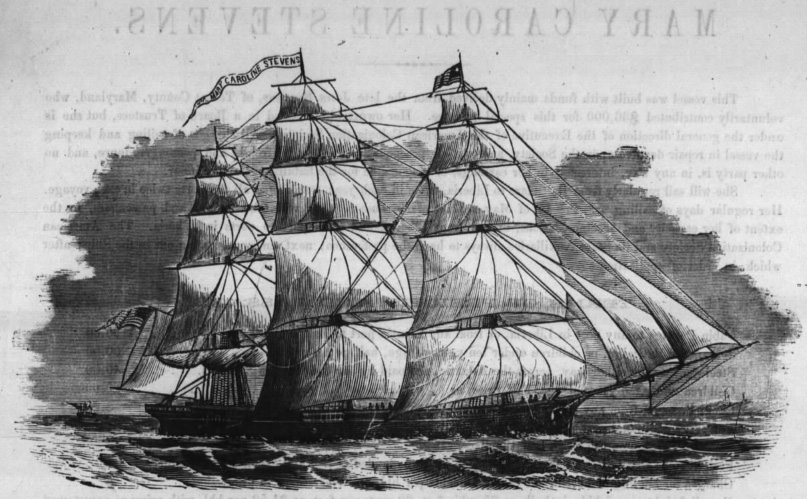To Address You as My Friend: African Americans’ Letters to Abraham Lincoln edited by Jonathan W. White, with a foreword by Edna Greene Medford. University of North Carolina Press, 2021. Cloth, ISBN: 978-1469665078. $29.95.
 Abraham Lincoln’s relationship with African Americans has long held a particular fascination for historians—and understandably so, given his status as the author of the Emancipation Proclamation. Most focus their attention on Lincoln’s well-known interaction with famous figures like Frederick Douglass, or his personal relationships with his barber William Fleurville, his valet William Johnson, or Mary’s seamstress, Elizabeth Keckley. Jonathan W. White’s excellent collection of letters from African Americans to the president fills a gap in this literature by including not only correspondence from Douglass and other well-known Black leaders of the time, but also many ordinary African Americans.
Abraham Lincoln’s relationship with African Americans has long held a particular fascination for historians—and understandably so, given his status as the author of the Emancipation Proclamation. Most focus their attention on Lincoln’s well-known interaction with famous figures like Frederick Douglass, or his personal relationships with his barber William Fleurville, his valet William Johnson, or Mary’s seamstress, Elizabeth Keckley. Jonathan W. White’s excellent collection of letters from African Americans to the president fills a gap in this literature by including not only correspondence from Douglass and other well-known Black leaders of the time, but also many ordinary African Americans.
“In writing to the president, enslaved and free African Americans were making an explicit claim to the rights of citizenship,” White observes. “In fact, the very act of writing became an act of political engagement” (5). These letters are part of a larger pattern of frequent contact between Lincoln and ordinary Americans—Black and white—to an extent unprecedented for presidents prior to 1860. In that sense, the letters in To Address You as My Friend flesh out a broader, multi-racial image of Lincoln’s democratic impulses, folding Black voices into the overall chorus of Americans seeking the president’s attention on nearly every conceivable subject.
An ordinary soldier named James T.S. Taylor, for example, wrote Lincoln in late 1864 asking for release from the guardhouse where he had been imprisoned for stealing rations. “I cannot have no better Source to apply for aid than to ask A Favor from your Hands,” Taylor implored the president (145). Another man, Hiram Vail, asked Lincoln to release his minor son from army service, citing the young man’s youth and complaining that his son had been “throed…on [railroad] Cars By Force” (116). It would not be difficult to locate letters from White Americans on much these same subjects.
But in another sense, this collection presents the unique voices and concerns of Black Americans; indeed, it is difficult to read any of the letters in this collection without concluding that their African American authors nearly always faced special (and often more difficult) circumstances than their white counterparts in enduring the war’s many challenges. Black writers urged Lincoln to drop his plans for voluntary colonization of the freedmen overseas; they apprised him of unfair recruiting practices inflicted upon Black soldiers; they complained of overly harsh prison sentences meted out to Black defendants; they asked for equal civil rights and the vote. Some letters were written by African Americans still enslaved in Border States not yet touched by emancipation. Annie Davis from Maryland, for example, begged Lincoln for advice in how she might compel her mistress to allow her to visit family on the Eastern Shore. “It is my Desire to be free,” Davis wrote, “you will please let me know if we are free and what i can do” (179).
Such appeals for presidential assistance permeate the letters in this collection, but rarely do the authors sound a note of passive victimhood. Quite the contrary, the prevailing tone is that of Black Americans respectfully demanding a citizen’s right to petition for the redress of grievances and the assistance and protection due them as fully-fledged members of the republic. “We are told and also we have read that you have declared all the Colored people free both men and woman,” noted a group of freedmen from North Carolina, “and if that be so we want to know where our wrights is” (220).
Having sifted through thousands of letters, many from collections heretofore untapped for publication, White, with an expert editor’s touch, has deftly assembled a wonderfully rich and fascinating mosaic of the hopes, dreams, and frustrations of African Americans during the Civil War. Lincoln’s own voice is somewhat muted here—as White points out, it is often difficult to know which of these letters the president actually read—but To Address You as My Friend illustrates the overwhelming positive, often deeply personal relationship Black Americans believed they enjoyed with the president who ended slavery. “These correspondents felt confident petitioning someone they considered their friend and their president, who had been concerned with their freedom and rights,” White writes (6). It is a point worth remembering. To Civil War era African Americans, Lincoln was very much the Great Emancipator.
Brian R. Dirck is Professor of History at Anderson University. Among his many books on Abraham Lincoln and the Civil War era is Abraham Lincoln and White America (2012).
